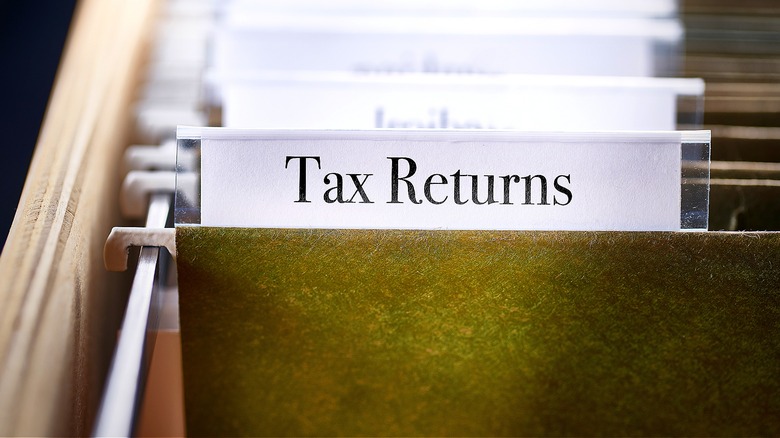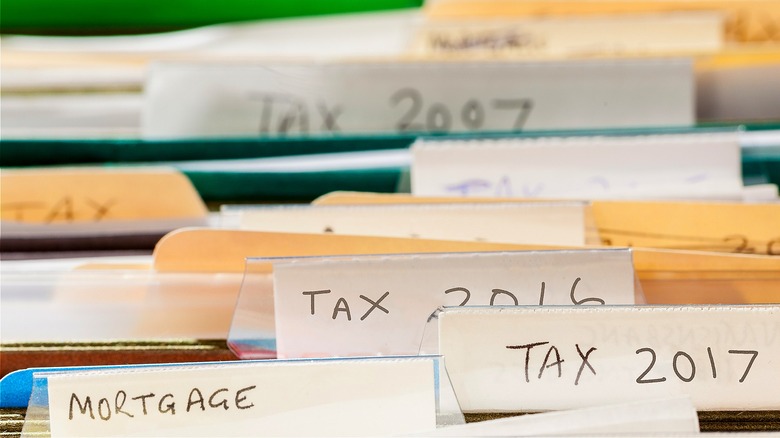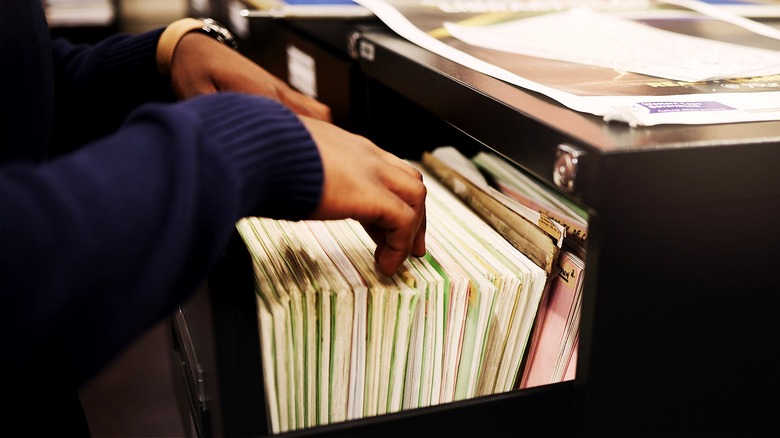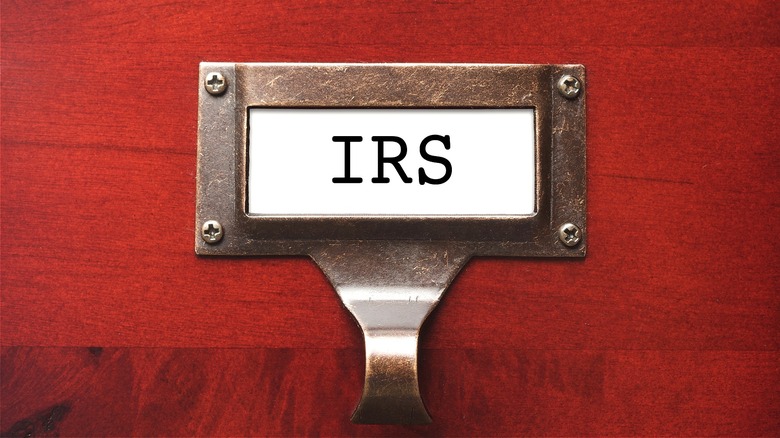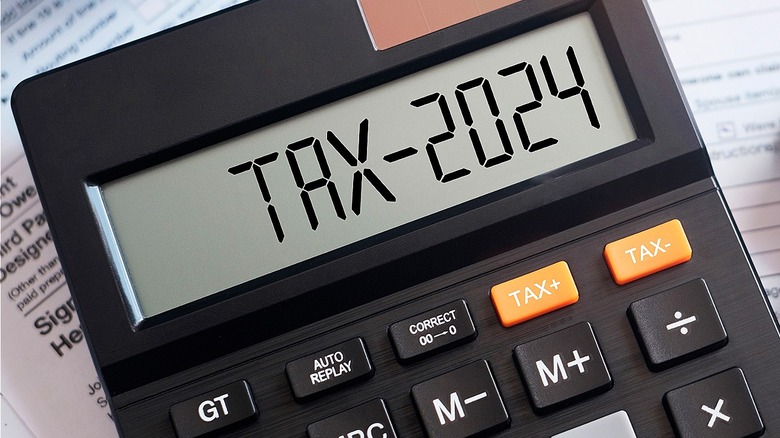How Long Should You Hold On To Your Tax Returns?
As Benjamin Franklin famously said, "Nothing is certain except death and taxes." Yes, every year, taxpayers know they'll need to file their tax returns before the deadline in mid-April (that is, unless they happen to be from the group of Americans who don't need to file taxes or they've confirmed a later filing date, as in the case of a natural disaster impacting them for the year). But, while we may know tax season begins in January and ends in April, we might still be uncertain about other dates — specifically, the dates related to how long we should hold on to our tax returns. For most of us? It's three years.
However, as with everything tax-related, there are exceptions and so, you'll want to make certain you're holding on to your tax records for as long as you'll need them. This will vary, depending on factors like if your tax return was underreported, say, or if you didn't file one at all. And so, while three years is how long you should hang on to your tax returns, in general, know you may need to store them for six years, seven years, or even perhaps forever. In this article, we take a look at the circumstances for each.
Keep tax returns for 3 years
In general, taxpayers should keep their tax returns and any supporting documents for at least three years. The reason for this are two-fold: 1) the IRS, generally, has three years to decide whether or not to audit a taxypayer and will only go back that far for its review, unless there's a "substantial error," and 2) a taxpayer has three years from the date they filed a return, or two years from when they paid a tax liability, whichever is later, to claim a refund or credit on the return. So, for most taxpayers, keeping their tax records for three years should be sufficient, as the statute of limitations will have run out by then.
As Lisa Green-Lewis, a TurboTax expert and CPA, told CNBC Make It, "You can go back three years to amend your taxes if you think you left something out of previous years' tax returns." What documents should you hold on to during this time? Basically, anything you needed to prepare the tax return; e.g., your W-2s, 1099s, and bank statements for your income; property tax assessments for your home; and retirement plan contribution information for your IRA. If you itemize, you should also store the records you need to back up those tax deductions, like receipts, invoices, documents substantiating your charitable contributions, etc. Also, for amended returns, note that this can't be done electronically; it must be done via paper and sent in via snail mail.
When to keep tax records for 6 years
As the IRS explains on its website, "Generally, the IRS can include returns filed within the last three years in an audit. If we identify a substantial error, we may add additional years. We usually don't go back more than the last six years." So, if you may have underreported your income for a tax year, it's important to keep your tax records for at least six years in case the IRS wants to take a closer look at your filing history via an examination.
Specifically, this six-year guideline applies to anyone who underreported their taxable income by more than 25%. For example, if you're self-employed, perhaps you lost a 1099 when you filed your taxes for one year, and as a result, you mistakenly underreported your income, a miscalculation the IRS didn't discover until a few years later. Should the IRS reach out to you about this error, you'll need your tax records to explain what happened.
When to hold onto them for 7 years
If you have stock investments, you may find you need to hold on to your tax records for seven years. Specifically, you'll need to if you write off the loss of worthless securities, i.e., a stock, bond, or other investment that has zero value. If you itemize this loss on your tax return, then you'll need to produce your records in case the IRS wants to inquire about the investment gone wrong and your deduction.
Another instance is if you write off a bad debt, which can be either business or nonbusiness. In the latter's case, it's when you loan money with the full expectation of it being paid back. The IRS makes clear there's a distinction between money given as a gift versus a loan. If you loan money to a family member, for example, and there's documentation proving it was meant to be loan — not a gift — and it becomes worthless because there's zero chance the family member will pay the amount back, then it would qualify as a nonbusiness bad debt, per TurboTax. Note, the loan must have been made in cash.
When to keep tax documents indefinitely
And finally, there are cases when you'll need to hang on to your tax records forever. For one, as the IRS explains, "Keep records indefinitely if you file a fraudulent return." Yes, if a taxpayer purposely files an inaccurate tax return, then the statute of limitations as far as the IRS auditing that taxpayer's tax-paying history is indefinite. So, in such a case, the person will need all their tax records, as the IRS can request to look more closely at anything.
Another instance is if you didn't file a return at all. For instance, if you're under 65 years of age and earned $12,950 or less, then you're exempt from filing taxes. This said, if you didn't file a return, you still need to keep your records proving how much you earned for the year, so that you can present it to the IRS, should it have questions about your missing year. Also, note that this exemption doesn't apply to self-employed taxpayers, who must file a return if they earn $400 or more.
Further, you'll want to hang on to records for any property purchased, including real estate, stocks, and other assets. This is so you can prove how much you originally paid for it (the cost basis). When you file your taxes for the year, you'll need to provide the date of purchase and the purchase price. This number will be used later on to determine your capital gains tax, should you sell the asset.
Be sure to check state requirements
Keep in mind these general rules concerning tax records and how long you should hold on to them apply to federal income tax returns only. For the states that levy income tax, taxpayers need to check with their state tax agency to learn if those document-retention rules are any different. For example, California taxpayers should hold on to their state income tax returns for at least four years — versus three for the IRS — because the California Franchise Tax Board notes it has that much time to issue an assessment.
As for keeping your tax records in order, you have two options: paper or digital. For paper, a filing system with folders for the individual tax years can work well; in a filing cabinet, you can also have sections for other important documents, like birth certificates, passports, military records, and legal filings. Alternatively, you could convert your paper records into electronic copies and store them in the cloud. This will not only reduce paper clutter, but various apps have features that can help you keep things tidy.
For those who do go the digital route, it's important to have a backup or two, as well as ensure you don't need the original document again. So, before you shred anything, be sure it's safe to do so. The IRS has indeed accepted digitized copies of receipts since 1997, so long as they adhere to the IRS's requirements; e.g., the copies must be legible and capture the exact info of the original document.
